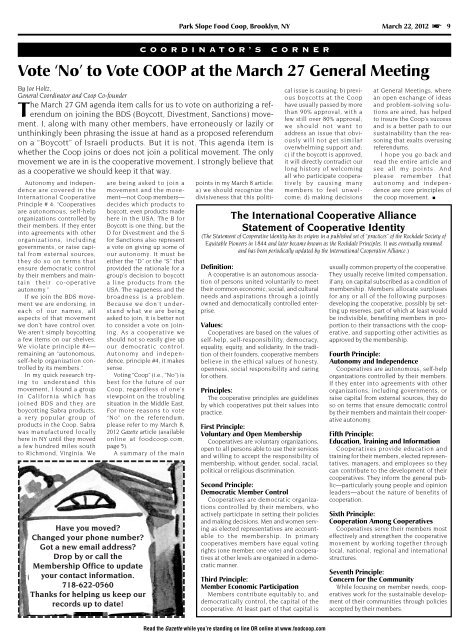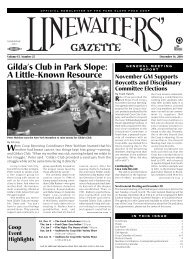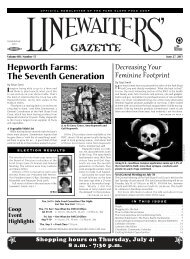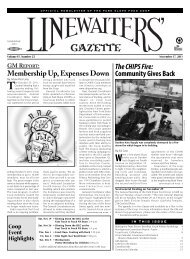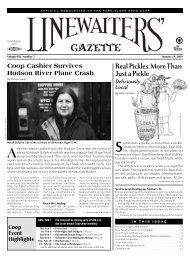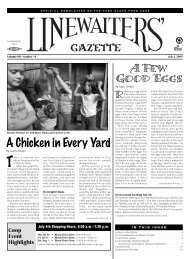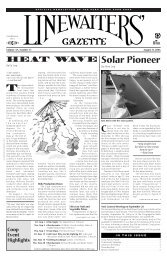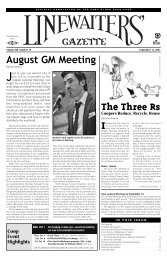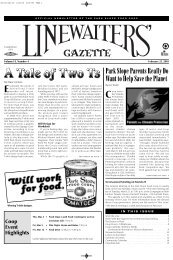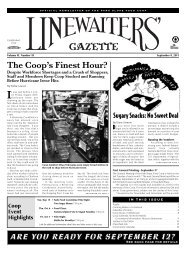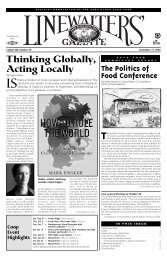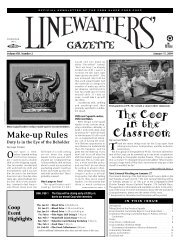February 2012 General Meeting - Park Slope Food Coop
February 2012 General Meeting - Park Slope Food Coop
February 2012 General Meeting - Park Slope Food Coop
Create successful ePaper yourself
Turn your PDF publications into a flip-book with our unique Google optimized e-Paper software.
12_03-22 p01-20_Layout 1 3/21/12 5:54 PM Page 9<br />
<strong>Park</strong> <strong>Slope</strong> <strong>Food</strong> <strong>Coop</strong>, Brooklyn, NY March 22, <strong>2012</strong> 9<br />
Autonomy and independence<br />
are covered in the<br />
International <strong>Coop</strong>erative<br />
Principle # 4: “<strong>Coop</strong>eratives<br />
are autonomous, self-help<br />
organizations controlled by<br />
their members. If they enter<br />
into agreements with other<br />
organizations, including<br />
governments, or raise capital<br />
from external sources,<br />
they do so on terms that<br />
ensure democratic control<br />
by their members and maintain<br />
their co-operative<br />
autonomy.”<br />
If we join the BDS movement<br />
we are endorsing, in<br />
each of our names, all<br />
aspects of that movement<br />
we don’t have control over.<br />
We aren’t simply boycotting<br />
a few items on our shelves.<br />
We violate principle #4—<br />
remaining an “autonomous,<br />
self-help organization controlled<br />
by its members.”<br />
In my quick research trying<br />
to understand this<br />
movement, I found a group<br />
in California which has<br />
joined BDS and they are<br />
boycotting Sabra products,<br />
a very popular group of<br />
products in the <strong>Coop</strong>. Sabra<br />
was manufactured locally<br />
here in NY until they moved<br />
a few hundred miles south<br />
to Richmond, Virginia. We<br />
COORDINATOR’S CORNER<br />
Vote ‘No’ to Vote COOP at the March 27 <strong>General</strong> <strong>Meeting</strong><br />
By Joe Holtz,<br />
<strong>General</strong> Coordinator and <strong>Coop</strong> Co-founder<br />
The March 27 GM agenda item calls for us to vote on authorizing a referendum<br />
on joining the BDS (Boycott, Divestment, Sanctions) movement.<br />
I, along with many other members, have erroneously or lazily or<br />
unthinkingly been phrasing the issue at hand as a proposed referendum<br />
on a “Boycott” of Israeli products. But it is not. This agenda item is<br />
whether the <strong>Coop</strong> joins or does not join a political movement. The only<br />
movement we are in is the cooperative movement. I strongly believe that<br />
as a cooperative we should keep it that way.<br />
are being asked to join a<br />
movement and the movement—not<br />
<strong>Coop</strong> members—<br />
decides which products to<br />
boycott, even products made<br />
here in the USA. The B for<br />
Boycott is one thing, but the<br />
D for Divestment and the S<br />
for Sanctions also represent<br />
a vote on giving up some of<br />
our autonomy. It must be<br />
either the “D” or the “S” that<br />
provided the rationale for a<br />
group’s decision to boycott<br />
a line products from the<br />
USA. The vagueness and the<br />
broadness is a problem.<br />
Because we don’t understand<br />
what we are being<br />
asked to join, it is better not<br />
to consider a vote on joining.<br />
As a cooperative we<br />
should not so easily give up<br />
our democratic control.<br />
Autonomy and independence,<br />
principle #4, it makes<br />
sense.<br />
Voting “<strong>Coop</strong>” (i.e., “No”) is<br />
best for the future of our<br />
<strong>Coop</strong>, regardless of one’s<br />
viewpoint on the troubling<br />
situation in the Middle East.<br />
For more reasons to vote<br />
“No” on the referendum,<br />
please refer to my March 8,<br />
<strong>2012</strong> Gazette article (available<br />
online at foodcoop.com,<br />
page 5).<br />
A summary of the main<br />
Have you moved<br />
Changed your phone number<br />
Got a new email address<br />
Drop by or call the<br />
Membership Office to update<br />
your contact information.<br />
718-622-0560<br />
Thanks for helping us keep our<br />
records up to date!<br />
Definition:<br />
A cooperative is an autonomous association<br />
of persons united voluntarily to meet<br />
their common economic, social, and cultural<br />
needs and aspirations through a jointly<br />
owned and democratically controlled enterprise.<br />
Values:<br />
<strong>Coop</strong>eratives are based on the values of<br />
self-help, self-responsibility, democracy,<br />
equality, equity, and solidarity. In the tradition<br />
of their founders, cooperative members<br />
believe in the ethical values of honesty,<br />
openness, social responsibility and caring<br />
for others.<br />
Principles:<br />
The cooperative principles are guidelines<br />
by which cooperatives put their values into<br />
practice.<br />
First Principle:<br />
Voluntary and Open Membership<br />
<strong>Coop</strong>eratives are voluntary organizations,<br />
open to all persons able to use their services<br />
and willing to accept the responsibility of<br />
membership, without gender, social, racial,<br />
political or religious discrimination.<br />
Second Principle:<br />
Democratic Member Control<br />
<strong>Coop</strong>eratives are democratic organizations<br />
controlled by their members, who<br />
actively participate in setting their policies<br />
and making decisions. Men and women serving<br />
as elected representatives are accountable<br />
to the membership. In primary<br />
cooperatives members have equal voting<br />
rights (one member, one vote) and cooperatives<br />
at other levels are organized in a democratic<br />
manner.<br />
Third Principle:<br />
Member Economic Participation<br />
Members contribute equitably to, and<br />
democratically control, the capital of the<br />
cooperative. At least part of that capital is<br />
points in my March 8 article:<br />
a) we should recognize the<br />
divisiveness that this political<br />
issue is causing; b) previous<br />
boycotts at the <strong>Coop</strong><br />
have usually passed by more<br />
than 90% approval, with a<br />
few still over 80% approval;<br />
we should not want to<br />
address an issue that obviously<br />
will not get similar<br />
overwhelming support and;<br />
c) if the boycott is approved,<br />
it will directly contradict our<br />
long history of welcoming<br />
all who participate cooperatively<br />
by causing many<br />
members to feel unwelcome;<br />
d) making decisions<br />
at <strong>General</strong> <strong>Meeting</strong>s, where<br />
an open exchange of ideas<br />
and problem-solving solutions<br />
are aired, has helped<br />
to insure the <strong>Coop</strong>’s success<br />
and is a better path to our<br />
sustainability than the reasoning<br />
that exalts overusing<br />
referendums.<br />
I hope you go back and<br />
read the entire article and<br />
see all my points. And<br />
please remember that<br />
autonomy and independence<br />
are core principles of<br />
the coop movement. ■<br />
The International <strong>Coop</strong>erative Alliance<br />
Statement of <strong>Coop</strong>erative Identity<br />
(The Statement of <strong>Coop</strong>erative Identity has its origins in a published set of “practices” of the Rochdale Society of<br />
Equitable Pioneers in 1844 and later became known as the Rochdale Principles. It was eventually renamed<br />
and has been periodically updated by the International <strong>Coop</strong>erative Alliance.)<br />
usually common property of the cooperative.<br />
They usually receive limited compensation,<br />
if any, on capital subscribed as a condition of<br />
membership. Members allocate surpluses<br />
for any or all of the following purposes:<br />
developing the cooperative, possibly by setting<br />
up reserves, part of which at least would<br />
be indivisible, benefiting members in proportion<br />
to their transactions with the cooperative,<br />
and supporting other activities as<br />
approved by the membership.<br />
Fourth Principle:<br />
Autonomy and Independence<br />
<strong>Coop</strong>eratives are autonomous, self-help<br />
organizations controlled by their members.<br />
If they enter into agreements with other<br />
organizations, including governments, or<br />
raise capital from external sources, they do<br />
so on terms that ensure democratic control<br />
by their members and maintain their cooperative<br />
autonomy.<br />
Fifth Principle:<br />
Education, Training and Information<br />
<strong>Coop</strong>eratives provide education and<br />
training for their members, elected representatives,<br />
managers, and employees so they<br />
can contribute to the development of their<br />
cooperatives. They inform the general public—particularly<br />
young people and opinion<br />
leaders—about the nature of benefits of<br />
cooperation.<br />
Sixth Principle:<br />
<strong>Coop</strong>eration Among <strong>Coop</strong>eratives<br />
<strong>Coop</strong>eratives serve their members most<br />
effectively and strengthen the cooperative<br />
movement by working together through<br />
local, national, regional and international<br />
structures.<br />
Seventh Principle:<br />
Concern for the Community<br />
While focusing on member needs, cooperatives<br />
work for the sustainable development<br />
of their communities through policies<br />
accepted by their members.<br />
Read the Gazette while you’re standing on line OR online at www.foodcoop.com


